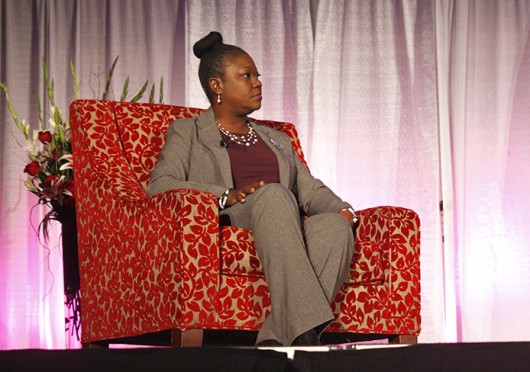
Trayvon Martin’s mother, Sybrina Fulton, spoke at the Ohio Union March 3.
Credit: Desiaire Rickman / Lantern photographer
Seeing her child dressed in a white suit stretched out across the coffin “like an angel,” Sybrina Fulton did what she described as something no mother wants to do — bury her own child.
Fulton is the mother of Trayvon Martin, the 17-year-old shot Feb. 26, 2012, by neighborhood watch leader George Zimmerman, allegedly in self-defense, in Florida. Zimmerman was found not guilty of second-degree murder and manslaughter in July.
“The worst day of my life was a few days after he had been shot and killed and I had to attend his funeral. I want you to live through my pain. I want you to feel what I am feeling without going through what I go through, and that’s why I came out and talk to you,” Fulton said at an event at the Ohio Union Monday evening.
Fulton said she disagrees with the concept behind any Stand Your Ground law.
“I think it’s awful that you have a law that gives a person the right to shoot and kill without being held accountable. I think you need to be accountable when you shoot and kill someone and there should not be a law that allows that to happen,” Fulton said in a press conference Monday before her talk.
The Stand Your Ground law allows for the use of deadly force in a self-defense situation and is in place in Florida, where Martin was killed.
A Stand Your Ground law has been considered in Ohio. In November, the Ohio House passed a bill with a Stand Your Ground provision that would not require people who are in a place they are legally allowed to be to retreat before using deadly force in self-defense. The bill is currently at the Ohio Senate awaiting a decision.
Davida Haywood, senior executive director of the Ohio State Multicultural Center, said solving the issue of racial profiling begins at the OSU campus.
“(Acknowledging that racial profiling is an issue has) been a long time coming given what happened here at the institution two years ago. And I think what tonight really exemplifies is the coming together of a village to say that we are not going to stand for being like this anymore and it’s going to take all of us as members of that village to make a difference and to impact change,” Haywood said.
In April 2012, the words “Long Live Zimmerman” were spray-painted on OSU’s Hale Hall, a building that was demolished in 2013 and previously held the Frank W. Hale Jr. Black Cultural Center. The incident was labeled a hate crime.
The reference, officials said at the time, was most likely to the Zimmerman-Martin case. The incident prompted the creation of the No Place for Hate Task Force and multiple campus demonstrations, including a protest that interrupted an April 2012 Board of Trustees meeting. The No Place for Hate Task Force came up with short- and long-term recommendations in the areas of awareness, climate and recruitment to combat racism, including the creation of hate crime alerts.
In the Monday press conference, Fulton said she has traveled throughout the country since Martin’s death, speaking to different universities and religious gatherings as an advocate.
Fulton said the Trayvon Martin Foundation, inspired by Martin’s death, aims to bring awareness and support to victims of gun violence.
“We felt that it was necessary and we felt that it was a missing piece in the communities that had so much violence and did not have anywhere to turn to,” Fulton said.
Fulton said colleges and universities were the reason Martin’s death was brought to the nation’s attention.
“That’s why it’s so important for us (the foundation) to come to the colleges and universities. Because it was the colleges and universities that started the movement, that started the rallies because they were upset,” Fulton said during the event.
Nichelle Veasey, a fourth-year in women’s studies, said she thought it was encouraging Fulton was able to be a inspirational speaker after the death of her son.
“I followed what had happened and I followed the trial and I felt like it was not fair, and that he really did not get his justice. And at the end of the day I support (Martin and his family),” Veasey said.
OSU Student Life, Student Life’s Multicultural Center and the Office of Diversity and Inclusion were some of the organizations that sponsored the event, hosted by 10TV news anchor and OSU alumna Tracy Townsend.
Richard Bailey, a third-year in communication, said he attended the event to learn about how Fulton overcame adversity.
“I believe in God, and I realized he had a true calling for (Fulton). Sometimes sacrifices have to be made to get the message out there. It’s terrible to lose a life, but so many other lives will be changed because of this,” Bailey said.
During the event, Larry Williamson, director of the Hale Center, awarded Fulton with a Kente cloth, which is a handmade African cloth.
“The award is a Kente cloth and in African history and religion and in African society, it’s one of the highest honors that you can get, so therefore what we do is when people make major accomplishments to the world, to our community, we want to honor that,” Williamson said.
Fulton said she hoped the audience took away one main message.
“If you cut me open from the inside, and I line a 100 people and cut them open, you would never know what color they were from the outside,” Fulton said. “We have to get past the color of each person’s skin.”


